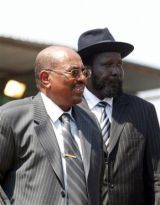Sudan’s president swap blame over fragile peace deal
Jan 9, 2007 (JUBA) — Sudanese President Omar al-Beshir and his southern deputy Salva Kiir on Tuesday traded accusations over failure to implement a north-south landmark peace agreement on the second anniversary of its signing.
 As humanitarian groups warned that the deal to end one of Africa’s bloodiest and most intricate civil conflict might unravel, the two leaders exposed the widening rift over the implementation of the accord.
As humanitarian groups warned that the deal to end one of Africa’s bloodiest and most intricate civil conflict might unravel, the two leaders exposed the widening rift over the implementation of the accord.
In a televised speech at Juba, the capital of south Sudan, Kiir blamed the ruling National Congress Party for delays in the implementation of some clauses of the agreement signed on January 9, 2005.
“Why does the National Congress continue to support armed groups to this day,” asked the First Vice President, referring to the militias still operating in the south despite provisions in the agreement calling for their dissolution.
“The continued military support from the Sudanese armed forces to the various armed groups in southern Sudan, including the Uganda rebels, the Lord’s Resistance Army (LRA) is still alarming,” said Kiir, accusing Khartoum of violating the peace deal.
The southern Sudan region is currently mediating talks between the Ugandan government and the LRA aimed at ending about two decades of fighting, whose effects are being felt in southern Sudan
Kiir also raised concerns over the disputed oil-rich Abyei zone, the demarcation of borders between north and south, and the sharing of oil-resources, all of which are sticking points in the implementation of the deal.
A visibly angry Beshir hit back, blaming delays on the south’s semi-autonomous government which he criticised for failing to get involved in the commissions set up to oversee implementation.
“We have waited for the representatives of the south for six months and have spent 60 million dollars so they can participate in the mechanisms for implementation,” said Beshir.
Kenyan Foreign Minister Raphael Tuju warned that ever-escalating animosity between the south and north could derail the agreement.
Animosity “could undermine every gain that you have achieved so far,” said Tuju, who represented the regional, seven-nation Inter-Governmental Authority on Development (IGAD), which mediated the peace deal.
Humanitarian groups have warned that the raging conflict in Sudan’s western region of Darfur had deflected attention from southern Sudan, which is also trying to reconstructs its infrastructure.
“With everyone concetrating on Darfur, the CPA (Comprehensive Peace Agreement) seems to be drifting off the international community’s radar,” warned Patty Swahn, the regional director for the International Rescue Committee.
“The slow process of implementing the agreement is extremely worrying. If there isn’t active support for the peace process, there is a real risk of renewed fighting,” she warned.
“The international community needs to understand how fragile the situation is and to engage actively in supporting the process and holding the parties to account,” added Gary McGurk, the deputy country director for CARE South Sudan.
Khartoum and the former rebel Sudan People’s Liberation Movement/Army signed the agreement in January 2005, bringing an end to more than two decades of civil war that claimed at least 1.5 million people and displaced around four million others.
The deal gives the south the right to vote whether they would secede or be part of Sudan by 2011.
But in Darfur, nearly four years of fighting between rebels from minority tribes and Khartoum, backed by a proxy militia called Janjaweed, has claimed at least 200,000 people and displaced two million others.
In July, the UN called on Beshir to accept the deployment of 20,000 UN peacekeepers to halt the violence in Darfur that has sparked what aid groups have described as one of the world’s worst humanitarian crisis.
Beshir steadfastly rejected any large-scale UN troop deployment there, but later endorsed a three-phase plan for the deployment of a “hybrid” AU-UN peacekeeping force.
(AFP)
